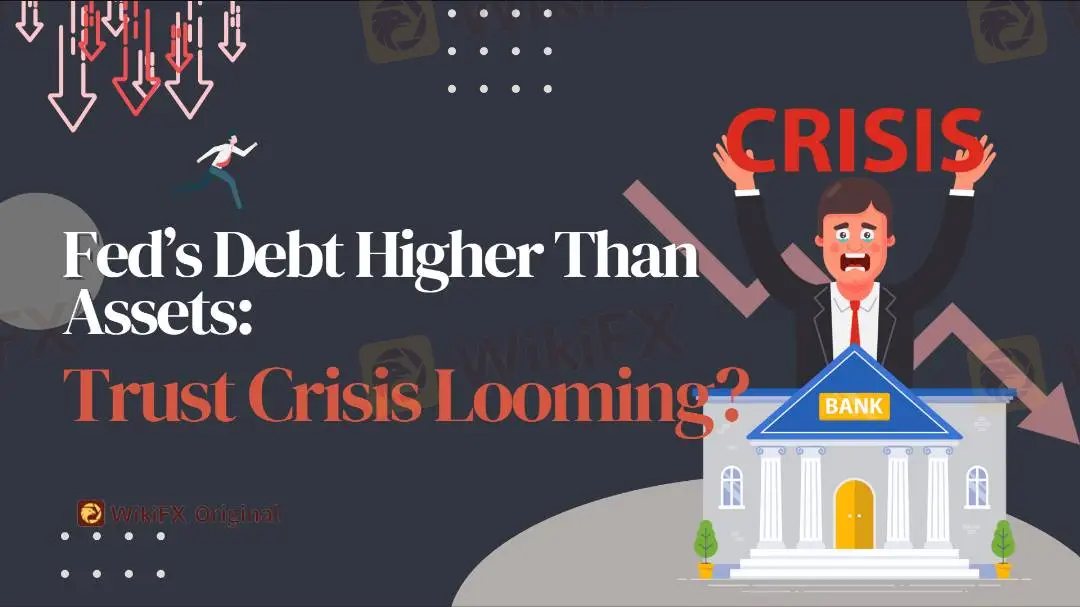简体中文
繁體中文
English
Pусский
日本語
ภาษาไทย
Tiếng Việt
Bahasa Indonesia
Español
हिन्दी
Filippiiniläinen
Français
Deutsch
Português
Türkçe
한국어
العربية
Fed’s Debt Higher Than Assets: Trust Crisis Looming?
Abstract:Since last year, the Federal Reserve (Fed) has implemented a series of interest rate hikes, resulting in increased interest costs for banks' reserve holdings. However, the returns on their assets have remained largely unchanged, leading to a situation where debt outweighs assets. This has raised concerns among market participants as any loss of confidence in the Fed could potentially cause significant disruptions.

According to a report from ChinesePress News, based on the H.4.1 balance sheet data as of the week ending April 27th, the indicator “Other Liabilities and Capital,” used to assess the net assets of the Federal Reserve, stood at negative $3.27 billion.

According to the accounting principles of the Federal Reserve, accumulated losses are recorded as “deferred assets” on the balance sheet under the asset column. Although this number is nominally an asset, it is essentially equivalent to accumulated losses, according to the Brookings Institution. As of the end of April, the Federal Reserve's deferred assets exceeded $52 billion, surpassing its paid-in capital and surplus, resulting in a negative net asset value.
The impact of the central bank's financial situation on the market remains to be seen. This appears to be the first time the Federal Reserve has encountered substantial negative assets, and the number of central banks in developed economies facing losses or negative net worth is unprecedented.
The report indicates that although this will not hinder the central bank's operations, there are two concerns in the market. One risk is the loss of confidence in the currency issued by the central bank. If panic intensifies, it may affect exchange rates.
The other risk is related to the central bank's independence, which could disrupt the market. When the Reserve Bank of Australia revealed a negative net worth in September last year, then-World Bank President Malpass stated that a central bank with negative book value would require even greater political support.

Disclaimer:
The views in this article only represent the author's personal views, and do not constitute investment advice on this platform. This platform does not guarantee the accuracy, completeness and timeliness of the information in the article, and will not be liable for any loss caused by the use of or reliance on the information in the article.
Read more

Navigating the Intersection of Forex Markets, AI Technology, and Fintech
The financial world is transforming, driven by the rapid integration of artificial intelligence (AI) and innovative fintech solutions. This change is most apparent in forex markets, where algorithmic trading and deep learning are redefining strategies, risk management, and decision-making. In this article, we explore how AI-driven technologies are not only revolutionizing forex trading but are also propelling fintech innovations that enhance customer experiences, bolster security, and unlock new market opportunities.

The One Fear That’s Costing You More Than Just Profits
The fear of missing out (FOMO) is NOT what you think it is! Read the three lesser-discussed components that contribute greatly to FOMO trading!

Bitpanda Secures Full Broker-Dealer License in Dubai
Bitpanda has officially obtained a full broker-dealer license from the Dubai Virtual Assets Regulatory Authority (VARA), marking a significant milestone in its international expansion. This approval, which follows preliminary authorization granted three months earlier, enables the European digital asset exchange to introduce its comprehensive suite of virtual asset services to investors in the United Arab Emirates (UAE).

RM457,000 Forex Fraud: Court Grants Conditional Release, Is Justice Delayed?
A Malaysian magistrate’s court has issued a discharge not amounting to acquittal (DNAA) for two former directors of an investment company implicated in a forex investment fraud case involving RM457,735.50.
WikiFX Broker
Latest News
Why Are Financial Firms Adopting Stablecoins to Enhance Services and Stability?
Experienced Forex Traders Usually Do This Before Making a Lot of Money
Octa vs XM:Face-Off: A Detailed Comparison
When High Returns Go Wrong: How a Finance Manager Lost RM364,000
Bridging Trust, Exploring Best—WikiEXPO Hong Kong 2025 Wraps Up Spectacularly
Interactive Brokers Expands Crypto Trading with Solana, XRP, Cardano, and Dogecoin
Fidelity Investments Explores Stablecoin Innovation in Digital Assets Sector
Why More People Are Trading Online Today?
SEC Ends Crypto.com Probe, No Action Taken by Regulator
Broker Comparison: FXTM vs XM
Currency Calculator







